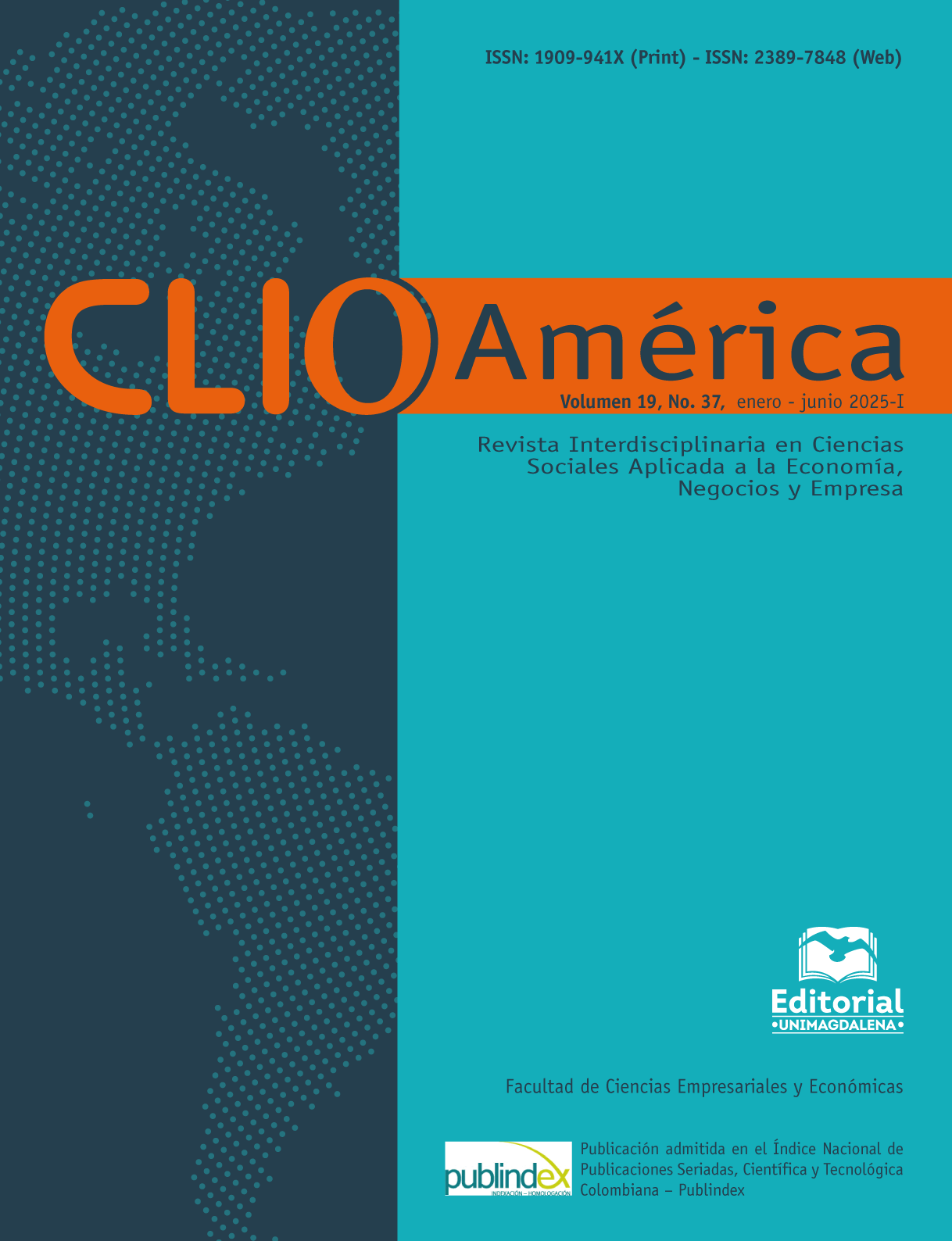Reflexiones entre las tensiones geopolíticas y la competitividad del Magdalena
Contenido principal del artículo
Resumen
El año 2025 inició con la agudización de turbulencias geopolíticas en el mundo, las nefastas consecuencias del conflicto entre Rusia y Ucrania, y el lamentable panorama en la dinámica belicista entre Israel y Palestina. También se dio el retorno de Donald Trump a la presidencia de Estados Unidos, lo que sumó más sacudidas en las relaciones políticas y comerciales entre el país del norte con China, la Unión Europea, Latinoamérica, entre otros. Todos estos movimientos abruptos y vertiginosos, naturalmente, impactan a Colombia y al Magdalena.
Descargas
Detalles del artículo

Esta obra está bajo una licencia internacional Creative Commons Atribución-NoComercial-CompartirIgual 4.0.
Esta revista proporciona un acceso abierto a su contenido, basado en el principio de ofrecer al público un acceso libre a las investigaciones ayuda a un mayor intercambio global del conocimiento. De igual forma su versión impresa es de libre acceso y no tiene costos asociados por publicación.
Citas
Charpin, R. y Cousineau, M. (2024). Friendshoring: how geopolitical tensions affect foreign sourcing, supply base complexity, and sub-tier supplier sharing. International Journal of Operations & Production Management. https://doi.org/10.1108/IJOPM-01-2024-0067
Consejo Privado de Competitividad; Universidad del Rosario. (2024). Índice Departamental de Competitividad 2024. https://compite.com.co/wp-content/uploads/2024/06/INFORME_IDC-2024_CAMBIOS_compressed-1.pdf
Cook, R. J., Ohle, M. y Han, Z. (2024). Geopolitical Kingmakers: South Korea and the Philippines as Linchpins amid the China–US Competition. The Chinese Journal of International Politics, 17(4), 379–403. https://doi.org/10.1093/cjip/poae019
Dai, Y.-S., Dai, P.-F. y Zhou, W.-X. (2024). The impact of geopolitical risk on the international agricultural market: Empirical analysis based on the GJR-GARCH-MIDAS model .
Deng, Y. (2024). Do domestic and external geopolitical risks matter for food availability: implications for global food security. Applied Economics, 56(60), 9211–9218. https://doi.org/10.1080/00036846.2023.2300766
Fayard, G. (2024). The geopolitics of outbound travel: Theorizing outgoing tourism as state strategy. Environment and Planning C: Politics and Space, 42(5), 881–900. https://doi.org/10.1177/23996544231216303
Foro Económico Mundial. (2025). Future of jobs report. https://reports.weforum.org/docs/WEF_Future_of_Jobs_Report_2025.pdf?_gl=1*heb1ur*_up*MQ..*_gs*MQ..&gclid=Cj0KCQiAwtu9BhC8ARIsAI9JHanWilwx63nS7qhjyw_ii9pLRtJH2sVgttbV85ZfAjR4cHxncaUPeUUaAk3CEALw_wcB
Freeman, A. (2024). The Geopolitical Economy of International Inequality. Development and Change, 55(1), 3–37. https://doi.org/10.1111/dech.12812
Hartwell, C. A. & Zadorozhna, O. (2024). The connections that bind: Political connectivity in the face of geopolitical disruption. Journal of International Management, 30(3), 101141. https://doi.org/10.1016/j.intman.2024.101141
Kelishomi, A. M. y Nisticò, R. (2024). Economic sanctions and informal employment. Labour Economics, 89, 102581. https://doi.org/10.1016/j.labeco.2024.102581
Li, T. M. (2024). Après le landgrab : violence infrastructurelle et « système mafieux » dans les plantations de palmiers à huile indonésiennes. L’Homme, 251–252, 129–164. https://doi.org/10.4000/134c1
Liu, K. y Fu, Q. (2024). Does Geopolitical Risk Affect Agricultural Exports? Chinese Evidence from the Perspective of Agricultural Land. Land, 13(3), 371. https://doi.org/10.3390/land13030371
Ministerio de Comercio Industria y Turismo. (2025). Perfiles Económicos Departamentales Departamento de Magdalena. https://www.mincit.gov.co/getattachment/estudios-economicos/perfiles-economicos-por-departamentos/perfiles-economicos-por-departamentos/magdalena/2025/enero/oee-jcy-perfil-departamental-magdalena-11feb25.pdf.aspx
Moyer, J. D. (2024). A double-edged sword into a plowshare: Analyzing geopolitical implications of alternative socioeconomic development pathways. One Earth, 7(2), 336–347. https://doi.org/10.1016/j.oneear.2024.01.002
Papagianni, E., Evgenidis, A., Tsagkanos, A. y Megalooikonomou, V. (2024). Tourism Demand in the Face of Geopolitical Risk: Insights From a Cross-Country Analysis. Journal of Travel Research, 63(8), 2094–2119. https://doi.org/10.1177/00472875231206539
Pasupuleti, M. K. (2024). Global Power Struggles: Geopolitical Tensions and Resource Conflicts in the 21st Century. In Geopolitical Tensions and Resource Wars: Navigating Global Conflicts in the 21st Century (pp. 281–306). National Education Services. https://doi.org/10.62311/nesx/46625
Prieto-Hernández, D. A., Borja-León, J. M. y Ballesteros-García, S. (2017). Tratados de libre comercio y competitividad, una lectura alternativa desde la nueva geografía económica. Clío América, 11(22). https://doi.org/10.21676/23897848.2136
Qi, Y. y Lindsey, G. (2024). The persistence of spatial mismatch in metropolitan America: New evidence on disparities facing Black workers and low-wage workers. Journal of Urban Affairs, 1–25. https://doi.org/10.1080/07352166.2024.2351402

